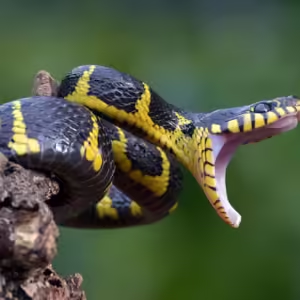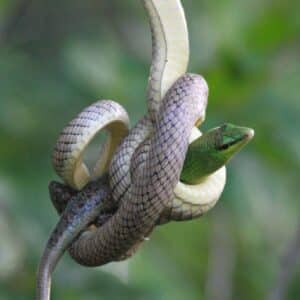Albinism is a genetic disorder inherited from parents that leads to little or no production of melanin, the pigment responsible for skin, eye, and hair color. While uncommon, this condition can affect individuals of any species, including humans, animals, and plants. Recently, Wild Florida Airboats & Gator Park in Kenansville, Florida introduced two adorable albino alligator hatchlings, showcasing the uniqueness of these rare creatures.
The animal park posted a photo of the two albino alligator hatchlings on Facebook, sparking astonishment among viewers due to their distinct appearance. While crocodilian reptiles typically exhibit varying skin colors, with darker-skinned gators appearing blackish-grey and lighter-skinned ones displaying olive green or light brown hues, albino variants stand out for their white skin. Albinism can occur in various animals, including reptiles, and white-skinned gators are exceptionally rare, with biologists estimating that only around 100 exist worldwide.

An alligator born with albinism typically exhibits ivory-colored skin and lightly pink-tinged eyes instead of the usual black-and-green pigmentation. This genetic condition arises from a recessive gene passed down from both parents to their offspring. For this gene to manifest in the offspring, both parents must carry it. Wild Florida endeavors to breed more of these rare specimens from nature, and fortunately, they have a pair of albino alligators named Blizzard (male) and Snowflake (female) to assist in this effort.

In August of last year, the fully albino alligator couple welcomed five offspring, but only one inherited the albino gene. Exactly one year later, the animal park enthusiastically announced that the albino gator couple had produced 18 eggs, two of which have hatched, bearing a striking resemblance to their white-skinned parents. Wild Florida assured everyone that the adorable hatchlings are in good health but will need intensive care and nurturing before they can be displayed to the public. For now, all we have is a photo showcasing the charming albino alligator babies.

Albino alligators, lacking melanin production, are deprived of the camouflage essential for their survival in the wild. Additionally, these white-skinned reptiles are highly susceptible to severe sunburns due to the absence of natural skin protection against harmful UV rays. Considering these factors, albino gators face a precarious existence in the wild, as they are ill-equipped to endure its challenges. Those born in captivity are housed in special enclosures that simulate their natural habitat while shielding them from direct sunlight. Consequently, albino gators residing in parks and zoos typically enjoy longer lifespans compared to their counterparts in the wild.

Their Lack of Camouflage and Skin Protection Renders Them Unsuitable for Survival in the Wild. The positive development from Wild Florida provides us with more chances to observe these rare creatures. Additionally, the two hatchlings were the first to emerge from the batch of 18 eggs. As a result, we still have 16 eggs awaiting hatching, offering further excitement.





